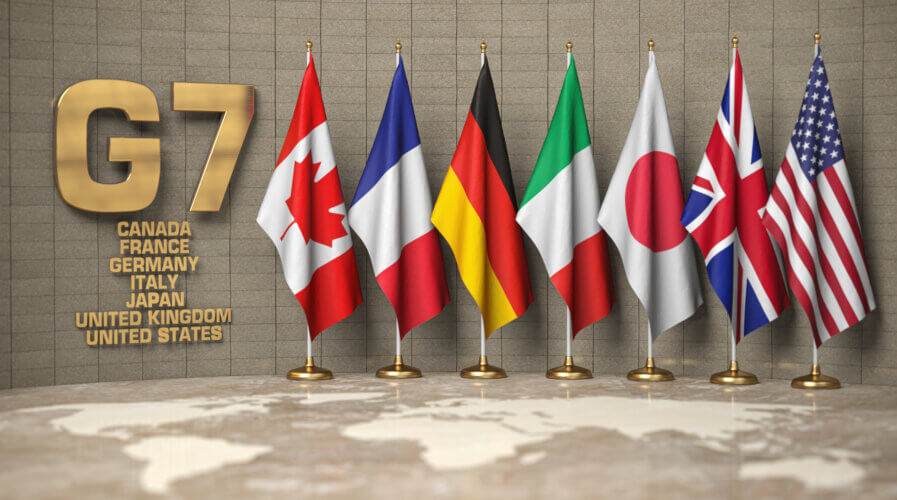
The G7 nations are inching closer to regulating AI. Here are their plans so far.Source: Shutterstock
As G7 nations inch closer to regulating AI, can it make a difference?
|
Getting your Trinity Audio player ready... |
- Over the weekend, leaders from the G7 nations agreed that “risk-based” regulation should be adopted regarding AI.
- The leaders also developed five principles for policymakers to govern AI and other emerging technologies.
- As the EU works on far-reaching legislation on AI, Italy lifted the ban on ChatGPT.
On April 30, leaders of the world’s wealthiest nations wrapped up their two-day G7 Digital and Tech Ministers’ Meeting in Takasaki, Japan. The meeting was in a series of ministerial meetings taking place in the next month’s run-up to the G7 summit. It was not much of a surprise when ChatGPT and generative AI topped the agenda, and surprisingly, it didn’t involve a call to pause developments in the field.
Instead, ministers from the G7 nations discussed how the fast-moving pace of AI development had highlighted the need for international standards to govern the technology. The G7 digital ministers aim to adopt an action plan to promote the responsible use of AI, calling for broad stakeholder participation in developing international standards.
“While the advancement of AI technologies can make a business of the government and the private sector more efficient and more productive, it could create unexpected challenges to democracy,” Japanese Digital Minister Taro Kono said during his address in the opening session of the meeting.
Such regulation should also “preserve an open and enabling environment” for the development of AI technologies and be based on democratic values, G7 ministers said in a joint statement issued at the end of a two-day meeting in Japan.
The ministers recognized that “policy instruments to achieve the common vision and goal of trustworthy AI may vary across G7 members”, but the agreement sets a landmark for how major countries govern AI amid privacy concerns and security risks.
“The conclusions of this G7 meeting show that we are not alone in this,” European Commission Executive Vice President Margrethe Vestager told Reuters ahead of the agreement. For context, ChatGPT, a generative AI chatbot by US venture OpenAI, gathered over 100 million users worldwide in less than three months.
The AI chatbot was trained on massive amounts of data, enabling it to process and simulate humanlike conversations with users. Therefore, the ministers from Britain, Canada, France, Germany, Italy, Japan, and the United States (US) plus the European Union (EU) expressed opposition to “the misuse and abuse of AI to undermine democratic values, suppress freedom of expression, and threaten the enjoyment of human rights.”
What are the G7 nations doing about it?
At the end of the two-day meeting, the joint statement cited five principles for policymakers to govern the use of AI and other emerging technologies — the rule of law, due process, democracy, respect for human rights, and harnessing opportunities for innovation. Countries have so far differed in their approaches to balancing innovative technology and regulations.
Japan, this year’s chair of G7, has taken an accommodative approach to AI developers, pledging support for public and industrial adoption of AI. Industry minister Yasutoshi Nishimura ahead of the ministerial talks last week said that he hoped to get the G7 “to agree on agile or flexible governance, rather than preemptive, catch-all regulation” over AI technology.
Separately, EU lawmakers on April 27 reached a preliminary agreement on a new draft of its upcoming AI Act, including copyright protection measures for generative AI. Vestager, EU’s tech regulation chief, said the bloc “will have the political agreement this year” on the AI legislation, such as labeling obligations for AI-generated images or music, to address copyright and educational risks.
French Minister for Digital Transition, Jean-Noel Barrot, also reckons that “Pausing (AI development) is not the right response – innovation should keep developing but within certain guardrails that democracies have to set,” adding that France will provide some exceptions to small AI developers under the upcoming EU regulation.
To recall, the EU was the first to react to the proliferation of OpenAI’s ChatGPT, with Italy being the first country in the world to impose a temporary ban on the AI chatbot last month. The Italian Data Protection Authority, known as Garante, launched a probe over techniques used to gather users’ personal information, citing a lack of a legal basis to justify pooling and storing user data to train the algorithms for ChatGPT.
The Italian watchdog also cited concerns about the absence of filters to ensure those who interact with the chatbot are older than 13. In explaining how it collects and uses training data, OpenAI said it had addressed concerns raised in March by that country’s privacy regulator.
OpenAI said it offers “greater visibility” into its privacy policies and opt-out forms. The company also added a new form for those in the EU who want to object to using their data for training AI programs and a tool to verify ages in Italy when customers sign up. Following that, regulators in Italy confirmed in a statement that they had allowed access to ChatGPT.
What’s next?
Overall, the G7 nations shared that they “plan to convene future G7 discussions on generative AI, which could include topics such as governance, how to safeguard intellectual property rights including copyright, promote transparency, address disinformation,” including information manipulation by foreign forces.
The ministers also discussed plans to create standard rules on a “data free flow system with trust,” or DFFT. The DFFT concept was proposed at the World Economic Forum in 2019 to facilitate trust-based cross-border data transfers. Japan said it aims to push the DFFT concept forward by getting an agreement from G7 members to launch an institutional framework in charge of fostering it.
Cybersecurity should still be the main concern
Interestingly, while the focus has been on AI regulations, the number of cyberattacks against companies and government offices in Japan has been also increasing since March, according to a report by Japan Times. Reports show that most of these cyberattacks are caused by DDoS attacks, which attempt to disrupt the online traffic of a server or network by overwhelming it with data.
While most of the cyberattacks were fixed quickly, there are concerns that these attacks could indicate plans for larger attack which could happen in the near future when the summit takes place.
“There is a possibility that (Japan) is being targeted as the host of the G7 summit, and we have warned relevant organizations to stay alert,” an official at the National Center of Incident Readiness and Strategy for Cybersecurity said.
READ MORE
- Safer Automation: How Sophic and Firmus Succeeded in Malaysia with MDEC’s Support
- Privilege granted, not gained: Intelligent authorization for enhanced infrastructure productivity
- Low-Code produces the Proof-of-Possibilities
- New Wearables Enable Staff to Work Faster and Safer
- Experts weigh in on Oracle’s departure from adland


